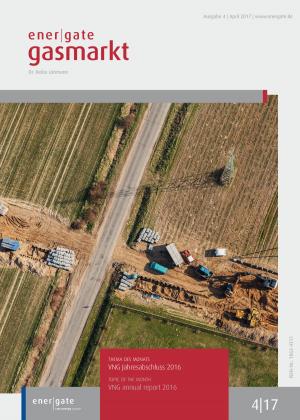There are topics being discussed of which ener|gate Gasmarkt is not aware. This was the case with the discussions between BNetzA and the relevant associations about establishing a new central register for all market master data (MaStR). But it has not yet created much excitement among market participants. But in 2017 it may take up some time of market participants in the gas sector, as well. “In the next year everyone will have to deal a lot with MaStR”, is the final sentence on the closing slide (slide number 151!) of a BNetzA workshop on MaStR from November 22 and 23. The aim of MaStR is to have one central database with all master data for all relevant actors (including network operators, suppliers, market places, as well as public institutions) in the energy sector and all relevant assets. For gas, the relevant assets are gas producing plants (natural gas production, biomethane plants, power-to-gas plants), gas consumers (industrial plants, power plants) directly connected to transmission systems, gas storage facilities and gas networks. Master data means all data relevant to identify and characterise companies and plants including contact persons, identity numbers and plant parameters. Templates are on the BNetzA web page. From July 1, the market participants will start fill the register with data. Already before that date, BNetzA itself will start to enter data on existing plants as far as the authority has knowledge of them. The IT platform was developed by the Magdeburg-based service provider regiocom. Regiocom is one of the large service providers also active in the gas sector for data storage and data exchange for the market and customer communication. But the company is still working on the new software.
Stay up to date with the free Gasmarkt-Newsletter! We will inform you about new issues by e-mail and give you an insight into the contents.
- All Issues
- energate Gasmarkt
- Issue 04|17
- Issue title:
VNG annual report 2016
- Publication date:
- 07.04.2017
- In this issue:
Naturally, I have my “favourite” companies and topics that I have been following for a long time. They play a rather big role in this edition. The VNG story is something I have been looking at since I started writing this publication. It is the last company on the traditional import layer that is still active in all parts of the value chain. How the company will develop in a difficult world with low sales and trading margins, as well as the Energiewende as a threat for future gas sales and a new owner is the topic of the month of this edition. With a bit of sentimentality, I report in this edition about Uniper’s sale of the share in the Russian gas field Yushno Russkoje. The whole story from the E.ON takeover of Ruhrgas with the ambition to create a national gas champion via the attempts to gain the Yushno Russkoje share to the complete E.ON/Ruhrgas withdrawal from the upstream business is part of the German industry history. I have worked a lot on these topics myself. An interesting aspect for the future is that Uniper is still to a considerable extent a gas company. Its profitability in the trading business stems completely from the gas business.
November 2015 was the last time ener|gate Gasmarkt had looked at the annual results of storage operators. The idea was to find out whether the reported misery of the industry can be found in their books and their profit & loss statements. At that time the conclusion was: Only partly. Except for RWE Gasspeicher, all operators were profitable. A major reason were the long-term contracts for the lease of capacity with the trading organisations of the owners. Table 6 shows that this did not change significantly in 2015 although the profits are very volatile. In the business year, again only RWE Gasspeicher reported a loss before taxes. And as in 2013 and 2014 high extraordinary depreciations on the Epe storage were responsible for that outcome. In the year 2015 64 million euros were written off, after 123.4 million euros in 2014. For the first quarter of 2016 innogy Gas Storage NWE published a separate report. The report shows that the company tried to take care of all remaining risks from the business. Another extraordinary depreciation on the value of the storage facilities of 143 million euros was made. But on the other hand, an extraordinary earning was booked. One customer (presumably RWE Supply & Trading) paid 250 million euros for premature termination of a long-term storage contract. As a result of both effects, innogy Gas Storage NWE reported for the first quarter of 2016 a profit of 131 million euros that was paid to the parent company. For the rest of 2016 the company expected a profit of 15 to 25 million euros. The message from the Q1 16 report should be: Innogy Gas Storage NWE is now able to cope with the difficulties of the storage market. Let’s wait and see!
Sales Contact

Frequently Asked Questions
1. What is the energate Gasmarkt?
The energate Gasmarkt provides specialists and executives in the gas industry with up-to-date information and background information on the German and international gas market. The medium expertly explains the most important developments in the fields of market, law, politics and business. In addition, the energate Gasmarkt offers insider information such as market rumors and personal details.
2. What is the energate Jahresreport Gas?
The energate Jahresreport Gas traces the most important market developments of the year and provides a well-founded outlook for the coming months. Gas expert and insider Dr. Heiko Lohmann analyzes relevant events in politics, law and regulation as well as on generation, infrastructure and trade. In addition, the report provides information on changes in the corporate landscape and tracks price developments in market reports. Top decision-makers from the industry use the Jahresreport Gas as a compact chronicle of the year and to assess future market developments.
3. How often are these publications released and in which formats are they available?
The energate Gasmarkt is published monthly. Subscribers will receive the energate Gasmarkt as a print and PDF version in German and English. The Jahresreport Gas is published annually (beginning of December).
4. Can I purchase individual issues of the energate Gasmarkt?
Yes, you can purchase individual isses as print or PDF version. Payment options include purchase on account, credit card or PayPal.
5. How much is a subscription of the energate Gasmarkt and how much does the Jahresreport cost?
A subscription to the energate Gasmarkt (single licence) costs 110,- Euro/month (plus VAT). An edition of the Jahresreport Gas costs regularly 390,- euro (plus VAT).
6. Are there any special conditions if several employees in a company would like to receive the Gasmarkt?
With several Gasmarkt recipients in one company, the price of the second and all other licenses is reduced significantly. We are happy to make you a fair offer for team or corporate licenses!
7. What benefits do I get by registering?
A free energate account is required to order the energate Gasmarkt or the energate Jahresreport Gas. Registered users receive an overview of the contents of the current issue of energate Gasmarkt by e-mail on the day of publication.
8. I would like to read energate Gasmarkt or energate Jahresreport Gas digitally. Where can I find my e-paper version?
As a subscriber to energate Gasmarkt or as a purchaser of energate Jahresreport Gas, you will also receive an e-paper version in addition to the print edition. You can find it at online.energate-gasmarkt.de. Please use your energate account to log in.


